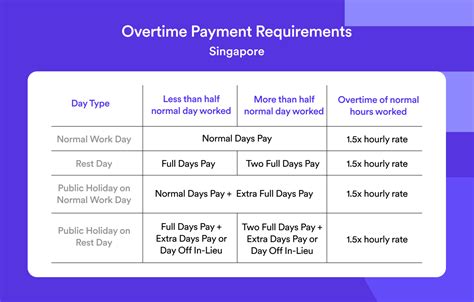Understanding Overtime Pay Calculation: A Comprehensive Guide

As an employee, you may have heard of overtime pay, but do you really know what it is and how it’s calculated? Overtime pay is an additional compensation for working more than the standard work hours and is required by law in many countries. In this comprehensive guide, we’ll explore everything you need to know about overtime pay calculation, including the legal requirements, different types of overtime pay, and how to calculate it accurately.
Legal Requirements for Overtime Pay
Before we dive into the specifics of overtime pay calculation, it’s essential to understand the legal requirements for overtime pay. In the United States, employers are required to pay overtime to non-exempt employees who work more than 40 hours in a workweek. The overtime pay rate is typically 1.5 times the regular hourly rate, although it can vary depending on the state and industry.
Exempt Employees
Exempt employees are not entitled to overtime pay and are usually salaried employees who are exempt from overtime pay due to their job duties, responsibilities, and compensation. Exempt employees typically include executive, administrative, and professional employees.
Non-Exempt Employees
Non-exempt employees are entitled to overtime pay and are usually hourly employees who work in jobs that are not exempt from overtime pay. Non-exempt employees usually include blue-collar workers, clerical workers, and service workers.
Types of Overtime Pay
There are different types of overtime pay, and understanding them is essential to calculate the accurate overtime pay for employees.
Regular Overtime Pay
Regular overtime pay is the most common type of overtime pay where an employee is paid 1.5 times the regular hourly rate for every hour worked over 40 hours in a workweek.
Double Overtime Pay
Double overtime pay is when an employee is paid twice the regular hourly rate for every hour worked over 40 hours in a workweek. Double overtime pay is often required for employees who work long hours or work on holidays and weekends.
Compensatory Time Off (Comp Time)
Comp time is when an employee is given time off in lieu of overtime pay. Comp time is often used in the public sector where overtime pay is restricted, and employees are given time off instead of overtime pay.
How to Calculate Overtime Pay
Now that we’ve covered the legal requirements and types of overtime pay, it’s time to learn how to calculate overtime pay accurately. There are different methods of calculating overtime pay, and the most common is the “time-and-a-half” method.
Time-and-a-Half Method
The time-and-a-half method is the most common method used to calculate overtime pay. It involves multiplying the regular hourly rate by 1.5 and then multiplying the result by the number of overtime hours worked.
For example, if an employee’s regular hourly rate is $20 per hour and they work 50 hours in a workweek, their overtime pay would be calculated as follows:
Regular hourly rate: $20
Overtime hourly rate: $30 (1.5 x $20)
Overtime hours worked: 10
Total overtime pay: $300 ($30 x 10)
Double Overtime Method
The double overtime method is used to calculate double overtime pay and involves multiplying the regular hourly rate by 2 and then multiplying the result by the number of double overtime hours worked.
For example, if an employee’s regular hourly rate is $20 per hour and they work 60 hours in a workweek, their double overtime pay would be calculated as follows:
Regular hourly rate: $20
Double overtime hourly rate: $40 (2 x $20)
Double overtime hours worked: 20
Total double overtime pay: $800 ($40 x 20)
Conclusion
Overtime pay is an essential component of an employee’s compensation, and understanding how to calculate it accurately is crucial for both employers and employees. By knowing the legal requirements, types of overtime pay, and the different methods of calculating overtime pay, you can ensure that both you and your employees are compensated fairly.
FAQs
What is the standard workweek for overtime pay?
The standard workweek for overtime pay is typically 40 hours in a workweek.
Are exempt employees entitled to overtime pay?
No, exempt employees are not entitled to overtime pay. They are typically salaried employees who are exempt from overtime pay due to their job duties, responsibilities, and compensation.
What is the overtime pay rate?
The overtime pay rate is typically 1.5 times the regular hourly rate, although it can vary depending on the state and industry.
What is double overtime pay?
Double overtime pay is when an employee is paid twice the regular hourly rate for every hour worked over 40 hours in a workweek.
What is compensatory time off?
Compensatory time off (comp time) is when an employee is given time off in lieu of overtime pay.
